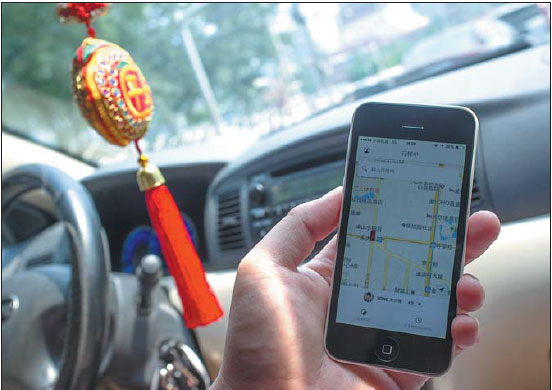Many thousands submit views on China's car-hailing services
Draft regulation seeks to integrate private cars into taxi management
The Ministry of Transport concluded soliciting public opinion in preparation for drafting regulations on app-based car-hailing services and a guideline about improving the development of the taxi industry on Tuesday.
The controversy between carhailing services and the traditional taxi industry is far from over.
Issued last month, the draft regulation and guideline intend to integrate online car-hailing services into the taxi management system and raise the entry standard for drivers.
The drafts stipulate that drivers of private cars obtain a license certificate to offer rides for payment through car-hailing platforms.
Because the drafts concern the interests of many people, they have drawn a great deal of attention and discussion by the general public.
The ministry said it received 6,832 opinions. About 903 of those only showed support or opposition to the drafts, while 5,929 gave detailed opinions and suggestions.
The three most mentioned topics were all related to car-hailing services, with 1,022 opinions on whether app-based car-hailing services should be managed and how.
In addition, 1,020 responses discussed the conditions and qualifications of cars and drivers that offer hailing services, and about 1,060 were related to things such as meters and identification of those cars.
"The reason for drafting the guideline and regulation is to ease traffic in big cities and improve taxi services," China Newsweek quoted Liu Xiaoming, a senior official of the Ministry of Transport, as saying.
"The purpose of reforming the taxi market is to serve the people," Liu said.
Liu said the ministry encourages and standardizes the development of online taxi services. The two drafts are temporary policy. "Opening them for public opinion is to respect the will of the people and abide by the law, so the people feel ownership of our reform," he said.
Wang Xiuchun, a taxi management official with the ministry, was quoted by Xinhua News Agency as saying the ministry hopes the pending changes will reduce taxi fees and improve drivers' incomes, while also making taxis more attractive than private vehicles.
In the past, the ministry has several times taken a stand against private vehicles being involved in taxi services.
In China, most taxis are owned and managed by taxi companies. The drivers have to pay a high deposit for the vehicle and monthly franchise fees to the companies.
Companies can obtain taxi management franchises through a bidding process. After obtaining the franchise, the companies decide fees for their drivers, which are often considered exorbitant.
Since last year, taxi drivers in several cities have protested that car-hailing services have taken their customers and lowered their already marginal profits. Many taxi drivers even quit the job and began working for carhailing apps.
"Many taxi drivers quit their jobs once the contract finished and now work for car-hailing platforms," said Hu Zhanwu, 46, a taxi driver in Beijing. "I would like to do the same when my contract ends."
Hu said he has to work 12 hours a day every day but only earns 3,000 yuan to 4,000 yuan ($470 to $627) per month.
Hu said drivers using car-hailing services can easily earn 5,000 yuan per month, working only eight hours per day, six days per week. "Much better than us," he said.
According to Hu, taxi companies in Beijing charge monthly franchise fees of 6,000 yuan to 6,500 yuan for each taxi, and a deposit of 10,000-15,000 yuan.
"The companies only need one and a half years to pay back the cost of the car," Hu said.
"I'm sure that the government is trying to ensure better pay for taxi drivers. However, it will be very difficult as the companies are used to the ways they did things. They certainly will figure out ways to take advantage of the drivers," Hu said.
Zhou Youxin, 40, a part-time Uber driver in Beijing, said the drafts are "not reasonable" and the ministry's policy is "far from reality".
"Beijing has had about 60,000 taxis since the 1990s, and now the number of taxis is more or less the same. But the population of the city has jumped a lot. The number of taxis simply cannot meet the needs of the people," Zhou said.
Zhou said he won't register his car as a car-hailing vehicle if the draft becomes policy, as the vehicle license would only be valid for eight years. "It may be suitable for full-time taxis, but not for part-time car-hailing vehicles," he said.
Xiao Xiong, 38, an advertiser from Beijing, thinks the vehicles offering hailing services should not be managed as taxis, as "the management ways of the taxi industry are far too old. The development of the industry is blocked by the interest groups."
According to Xiao, car-hailing services are a part of a sharing economy. "It is environmentally friendly. The drivers can make the most use of their vehicles, and we don't need to add more cars on the road," he said.
Xiao agrees with the draft that drivers should get permits to offer rides, and be under supervision for safety reasons.
duxiaoying1@chinadaily.com.cn
|
Car-hailing services are still under heated debate in China and their future is uncertain. Provided To China Daily |
(China Daily 11/16/2015 page19)















